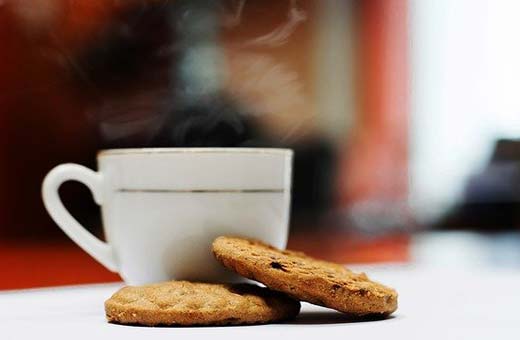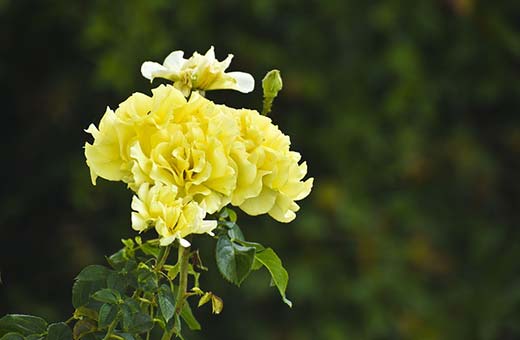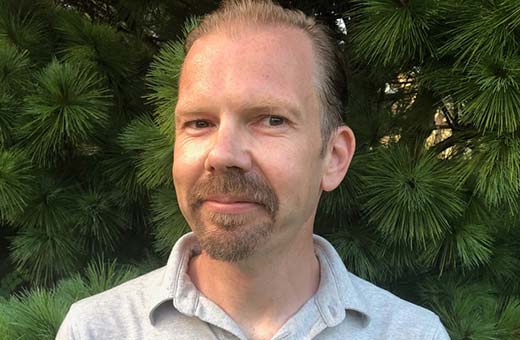 ‘I once made love on the Orient Express wearing nothing but a scarlet ribbon,’ Ruth said, taking another sip of her tea.
‘I once made love on the Orient Express wearing nothing but a scarlet ribbon,’ Ruth said, taking another sip of her tea.
‘Oh.’ He blinked. ‘Weren’t you cold?’
‘Was I cold? Was I cold? Romance; lust; the thought of my almost entirely naked body, and you ask if I was cold? What’s the most exciting sex you’ve ever had? Accidentally left the landing light on?’
Les took a bite of biscuit. Slowly.
‘I’m not sure I -.’ He thought. ‘Well, Grange-over-Sands, on the dunes. Sand was everywhere.’ He lowered his voice for ‘everywhere’.
‘That’s more like it,’ said Ruth, taking the remaining half of his biscuit from him and popping it in her mouth.
‘Did you really? The Orient Express?’
‘No.’ She swallowed the biscuit. ‘I wish we had. When we were first married we couldn’t afford it, not by a long way. John was saving up because he knew it was a dream of mine – I saw that film, you know. With Jacqueline Bisset. I loved the perfection of it. The train, not the film. Everything in the little cabin made to fit, just so, the excess of it. It made me want to indulge, and to be indulged.
‘But then the boys came along, and we put the money to a bigger house, and when they left home John wanted to go on a cruise, and “wouldn’t those compartments be a bit small”, he said. We never so much as did it on the Woolwich ferry, let alone the Orient Express. And now we’re here.’ Ruth looked around.
The silence between the swings of the pendulum of a grandfather clock running two decades slow seemed to fill the lounge. A large TV, one of the old cathode-ray-tube ones that even Ruth hadn’t seen in years, flickered away in the corner, its picture bleached in yellows and greens, its sound turned down to a mutter. There were more than a dozen mismatched, high-backed chairs, mostly occupied by very elderly women. Frail, translucent, and stuck in super-slow-motion. One of the residents, a rare male, let out a short grunt.
‘What do you regret not doing?’ Ruth said.
Les took a mouthful of tea and stared at the wipe-clean carpet.
‘That’s a big question,’ he said.
‘It’s a small question,’ she said.
‘Alright, it’s a small question that requires a big answer,’ he said. He looked across the room at his wife. She sat in one of the high-backed chairs. She stared in front of her, looking a little to the left of the television screen. She hadn’t spoken today other than to say, ‘an extra shilling’ when he arrived. A mug of tea beside her had gone cold whilst he sat with her, telling her about his week. As he watched now a care assistant with a trolley took the cold tea and replaced it with warm.
‘I regret… I regret…’ He had more tea to buy thinking time. It was too weak, too milky. He breathed in. ‘We went on holiday once to Scotland, rented a cottage on the shore of a loch. French windows from the bedroom opened into the garden, a little patio with a table and two chairs, and then nothing but grass to the stones at the water’s edge. You could sit at that table and drink your tea and watch the seals on the rocks. We were there three nights. Each night we said – we should wake early and watch the sun come up. But we overslept every day. Never sat at that table, despite it being right there. We’d wake up, look at the time, and rush off to see all the sites we’d planned in for the day. Too busy to breathe the air in front of us.’
Ruth nodded, her head a little to one side.
‘That’s what I mean,’ she said softly.
They finished their tea in silence. The room seemed to wait with them.
‘I should say my goodbyes and get going,’ he said.
‘As should I.’
They got to their feet, walked separately through the seated bodies, minds wandering or lost. They squatted by respective chairs on either side of the room, Les with his wife, Ruth with her husband. They said their goodbyes, their I’ll-see-you-next-weeks, their unspoken are-you-still-in-there?s.
Ruth held John’s hand. Forty years since she first held that hand, since that hand first held hers. A hand that had once known every part of her. Had touched, caressed, fondled, bathed, gripped, grabbed, massaged, excited every part of her. And now she didn’t know if he knew it was her hand holding his.
At the door Ruth and Les came together again.
‘How do you fancy doing something you’ll regret?’ said Ruth.
‘I haven’t done that in decades,’ said Les. ‘I’m not sure if that’s something I regret,’ he added, but uncertainly.
‘Let’s go on a date,’ she said. ‘Greenwich, George II, next Saturday, one in the afternoon. We can come on here after. Wear a pink carnation so I’ll recognise you.’
Les blinked. Ruth twinkled.
‘If you’re very good I’ll let you take me on the Woolwich ferry,’ she said. And she was gone.
*
 Les waits beneath the statue, his palms sweaty. He is wearing a cream linen suit and feels a little self-conscious. He pulls a handkerchief from his pocket and wipes his hands on that. There are tourists walking, voices laughing, feet meandering, as does the river in the distance through a gap in the buildings. He checks the carnation and straightens his tie.
Les waits beneath the statue, his palms sweaty. He is wearing a cream linen suit and feels a little self-conscious. He pulls a handkerchief from his pocket and wipes his hands on that. There are tourists walking, voices laughing, feet meandering, as does the river in the distance through a gap in the buildings. He checks the carnation and straightens his tie.
Chatter in several languages. A horn, a bicycle bell, the growl of cars. A river ferry, moving north. A plane circling to land at City airport. Clouds build up the energy to scud, then decide against it.
For what feels like a long time nothing attracts his attention for more than a few seconds. Then a voice.
‘Excuse me?’ Is that the first time it’s been said? A tap on his shoulder with one hand, an offered camera in the other.
‘Would you mind taking a picture of me and the wife? We never seem to have any photos of the two of us.’
Les is surprised. Not so much by the question, but by the accent. Sounds like a local rather than a tourist.
‘Oh, not at all. How do I work it?’
The couple pose beneath the statue. Les steps back, takes their picture, returns the camera.
‘Thank you.’
Les smiles and nods, then looks at his watch. He looks around, sees a bench with an empty seat. He pulls a book out of his pocket, steps towards the bench. Changes his mind, puts the book back. Stays where he is beneath the statue.
He looks at his watch again, second-hand moving.
‘I said a pink carnation! I almost didn’t recognize you in a yellow one. And I was joking.’ Ruth is suddenly there, he hadn’t seen her approaching. Casual, floating, a walking smile. ‘And I presume you’re joking with that suit?’ She laughs at his expression. ‘I’m teasing! You look dashing. Like someone from a Merchant Ivory production. Are you the repressed one or the libertine? Shall there be scandal?’
They kiss, in an uncoordinated way: he goes for both cheeks, she goes for both lips.
‘Hello,’ he manages.
‘And hello to you. If it makes you feel any better, I am late because I tried on everything in my wardrobe, decided it wasn’t good enough and had to dash out to the market to buy something new and chic. What do you think?’
Ruth does a twirl. Les grimaces.
‘That bad?’ Says Ruth, her brow compressing.
‘No, no, sorry, not you. You look fabulous, an exhalation of beauty and self, no, I – I just dressed for a – well, I don’t know – I haven’t worn a tie except at funerals in years. Well done on being you, and shame on me for forgetting to be me.’
‘Oh. Well, alright then. We need to fix that. To the market. How would you dress your soul for you? When you were growing up? Were you a Bohemian? A Mod? A Pirate? An accountant?’
She puts her arm through his and they start to walk across the courtyard beneath the endless sky.
‘I wasn’t anything. We had no money; I wore what I was given, which my mother made from old curtains until I was big enough for my dad’s old clothes. Not like my boy. He had a thing for waistcoats. Loud, brilliant waistcoats. Terrible things, but at least he had the choice.’
‘Does he still wear them?’
‘Oh, no. He actually is an accountant.’
Ruth smiled. ‘You forget I’ve met him. He’s a landscape gardener.’
‘That’s the other one,’ says Les.
‘An exhalation of beauty and self? Is that a quote?’ she says. It was Les’s turn to smile.
Les’s palms were less sweaty.
They walked on through the crowds towards the market.
On the umpteenth stall, Ruth picked some clothing and shooed Les into a changing cubicle. Were this a film this would have triggered the changing montage.
Les as a hippy, round glasses with coloured lenses and a long wig. Ruth laughing.
Les as a soldier, 1940s uniform, creases perfect. Ruth saluting.
Les as a French philosopher, beret, necktie and Gauloise. Ruth wiggles her eyebrows then chokes on the smoke. ‘But keep the beret, just in case.’
In real life they leave the market with Les dressed exactly as he was when he went in but with his tie removed and top button undone.
Les and Ruth walk arm in arm by the river. The heavy, grey river.
‘Is it wrong, what we’re doing?’ says Les.
‘You say nothing at all then come right out with it, don’t you? You think far too much. Did you just, for a few moments, forget about everything else enough to actually have fun?’
‘Of course, but-’
‘Of course, nothing. Then have fun. Do you want to dance?’
‘I can’t dance,’ says Les.
‘Oh, you poor thing. You think dancing has rules. You think dancing is one two, left foot, one two, right foot. You think dancing is practising for years to be a swan, or a toy, or an illusion.’
‘I can’t dance.’
‘Dancing is just moving to the music in your head. No one is watching.’
‘They’re all watching.’
‘No one is watching you. They don’t know you. No one knows you. Just you.’
She dances around him a little and takes his hands. He doesn’t move his feet at first but watches her face. Then she takes his arms, and they move together a little. A little more. And suddenly they’re quite good, eye to eye, in time with each other, not necessarily with anything else. After a little while they stop. Two passers-by who had paused to watch clap them. Les looks away in embarrassment.
‘Oh, shush, you. Perhaps they can see you. And aren’t you beautiful?’ she says. And then: ‘It’s not wrong. It’s not right either. It just is.’
Les thinks for a moment, then nods.
They wait for the river bus. They are holding hands.
On the river bus Les sits by the window with Ruth next to him. They look out at the water and the buildings bursting forth on the banks.
‘I remember when this was all a wasteland. We weren’t allowed to play down here when I was growing up. Unexploded bombs, unstable old buildings,’ he says. ‘Of course we ignored that and spent most of our time here. The risk we took, every step, we might fall through into a cellar we didn’t know about, or tip over a wall that would flatten us, or blow ourselves up and leave a crater the size of a bus. It was exhilarating, but we were young and felt. I get the same feeling now when I decide to stay up past ten o’clock.’
She squeezes his leg. They look at each other.
‘Bankside for the Tate Modern and the Millennium Bridge,’ says the tannoy.
Les and Ruth get off the river bus and walk in front of the gallery.
‘Would you like an ice cream?’ says Les.
‘I would love an ice cream.’
‘What flavour?’
‘Surprise me. Though don’t surprise me with anything involving strawberries. I don’t like them.’
‘Yes, my lady.’
Les goes off to find ice cream. Ruth goes to sit on a bench. Behind her on another bench two teenage girls talk loud and London.
‘I said “are you planning on kissing me, like, ever?’’ says the first girl, drinking from a can and allowing her friend to get a word in.
‘You never! What did he do?’
‘He ran off, dinnee? Loser.’
She notices Ruth watching them and smiling.
‘What you want, grandma?’
‘Nothing. You have a lovely day,’ smiles Ruth.
The girls grab each other and shuffle off, the bubble of their loud private conversation popped. Ruth watches passers-by and the river in equal measure. Les returns with two ice creams.
‘Ooo, it’s like Christmas in summer. Whaddidya get me?’
She licks the ice cream and thinks.
‘Vanilla and toffee?’
‘It had some fancy name I forget.’
‘What did you get?’
‘I went a little avant garde. A sorbet. Peach and papaya. It’s particularly pleasing to pronounce.’
‘Let me lick.’
They exchange licks of their ices. Ruth stares at him as he sits and licks again.
‘What?’ says Les.
‘Are you planning on kissing me, like, ever?’ says Ruth. Les opens his mouth to say something. She puts her finger on his lips.
‘Sit still and eat your ice cream or kiss me, no words.’
He chooses the second option.
‘Good choice, but next time pick more complementary ice cream flavours,’ says Ruth, a little breathlessly.
She smiles so warmly at him. He smiles back.
Les and Ruth finish their ice creams and set off walking again, hand in hand.
‘There were two girls there whilst you were buying the ice cream who I am very pleased my grandchild is nothing like,’ says Ruth.
‘Mine are at university now. Don’t know why, they’re all studying useless subjects. What can you do with a degree in Puppetry? Or Football Studies? Or Law?’
Ruth stops and pulls in front of him.
‘I’m not doing anything on Saturday, so you could come round to my flat if you feel like it,’ she says.
‘It is Saturday,’ says Les.
Ruth stops and stares at him until she sees the penny drop.
‘Do you feel like it?’
A beat, an echo, a memory.
‘Ah. Of course. Yes. Let me do the cooking,’ says Les.
‘What cooking?’
‘Any cooking. It calms me, and I will need calming.’
‘Alright. You can do the cooking. We need to be careful, though.’
‘We do.’
‘Some people will have Opinions.’
‘They will.’
‘Best disengage.’
They let go of each other’s hands before turning a corner, the residential home ahead, the conspirators of their old lives within.
***
Antony Dunford is from Yorkshire, though he has spent a surprising amount of time in Hertfordshire as well. He reads on trains, in bed, and in the bath. He walks listening to audiobooks. He writes when it’s quiet, first thing in the morning or last thing at night. He has recently completed an MA in Crime Fiction at the University of East Anglia. His first novel, Hunted, will be published in January 2021. @antony_dunford
Your support lets us know our work is appreciated. We’re a paying market, publishing brilliant new work of fiction and non-fiction that comes our way. As a small group of volunteers, we’re dedicated to writers, readers, and publishers and want to keep our site ad, pop-up, and fire-wall free. Please do consider supporting us in whatever way you can. Thank you.


